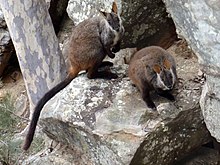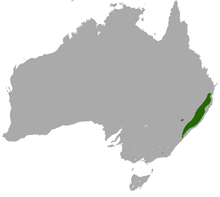Brush-tailed rock-wallaby
| Brush-tailed rock-wallaby | |
|---|---|
 |
|
| Scientific classification | |
| Kingdom: | Animalia |
| Phylum: | Chordata |
| Class: | Mammalia |
| Subclass: | Marsupialia |
| Order: | Diprotodontia |
| Family: | Macropodidae |
| Genus: | Petrogale |
| Species: | P. penicillata |
| Binomial name | |
|
Petrogale penicillata (Gray, 1827) |
|
 |
|
| Brush-tailed rock-wallaby range | |
The brush-tailed rock-wallaby or small-eared rock-wallaby (Petrogale penicillata) is a kind of wallaby, one of several rock-wallabies in the genus Petrogale. It inhabits rock piles and cliff lines along the Great Dividing Range from about 100 km north-west of Brisbane to northern Victoria, in vegetation ranging from rainforest to dry sclerophyl forests. Populations have declined seriously in the south and west of its range, but it remains locally common in northern New South Wales and southern Queensland.
As part of the acclimatisation movement of the late 1800s, governor Grey introduced this and four other species of wallabies (including the rare parma wallaby) to islands in Hauraki Gulf, near Auckland, New Zealand, where they became well-established. In modern times, these populations have come to be viewed as exotic pests, with severe impacts on the indigenous flora and fauna. As a result, eradication is being undertaken, after initial protection for review of their Australian populations and the return of some wallabies to Australia. Between 1967 and 1975, 210 rock-wallabies were captured on Kawau Island and returned to Australia, along with thousands of other wallabies. Rock-wallabies were removed from Rangitoto and Motutapu Islands during the 1990s, and eradication is now underway on Kawau. Another thirty-three rock-wallabies were captured on Kawau during the 2000s, and returned to Australia, before eradication began.
...
Wikipedia

